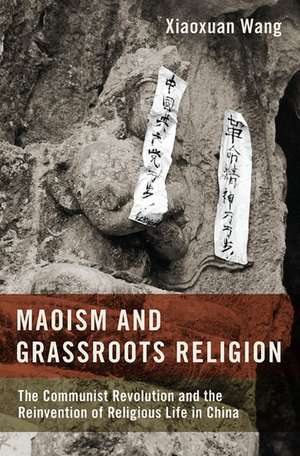Maoism and Grassroots Religion: The Communist Revolution and the Reinvention of Religious Life in China
Autor Xiaoxuan Wangen Limba Engleză Hardback – 18 iun 2020
Preț: 200.45 lei
Preț vechi: 219.72 lei
-9% Nou
Puncte Express: 301
Preț estimativ în valută:
38.36€ • 40.05$ • 31.74£
38.36€ • 40.05$ • 31.74£
Carte disponibilă
Livrare economică 03-10 martie
Preluare comenzi: 021 569.72.76
Specificații
ISBN-13: 9780190069384
ISBN-10: 0190069384
Pagini: 240
Dimensiuni: 236 x 157 x 25 mm
Greutate: 0.48 kg
Editura: Oxford University Press
Colecția OUP USA
Locul publicării:New York, United States
ISBN-10: 0190069384
Pagini: 240
Dimensiuni: 236 x 157 x 25 mm
Greutate: 0.48 kg
Editura: Oxford University Press
Colecția OUP USA
Locul publicării:New York, United States
Recenzii
Wang's careful reading and field research provides a well-rounded and nuanced approach. As such, the study is an excellent starting point for understanding the continuity and transformation of religion in China since 1949. This book would work especially well as a text for advanced undergraduate and graduate courses on the historical and sociological study of religion in China.
Its detailed stories, further, provide an excellent resource for teaching about the multiple and unexpected trajectories of the Chinese Communist revolution at the local level, which insists on the Maoist revolution as both destructive but equally generative for religious life in China.
Overall, the community of scholars studying modern Chinese religions will greatly benefit from this careful research on religion and politics in a mostly rural corner of China during the under-researched Maoist era. There are some unexpected findings that deserve reflection and will make us rethink certain assumptions.
Using a combination of documentary collection and oral history, it explores the complex relationship between the communist revolution and religious life at the grassroots level, as well as the impact of the legacy of Maoism on religion in China today...In general, this book enriches our understanding of grassroots religious life during the Máo era and reminds us to pay attention to the impact of the Máo-era legacy on religious life in China today. The book makes outstanding contributions to the relationship between church and state in China, the history of religion in China, and the history the Máo era. This book is suitable for readers and researchers interested in these areas.
Readers will come away with some fascinating insights into the operation of the state between the sub-county and provincial levels, which is no doubt at least partly a reflection of Wang's use of archival documents.
Its detailed stories, further, provide an excellent resource for teaching about the multiple and unexpected trajectories of the Chinese Communist revolution at the local level, which insists on the Maoist revolution as both destructive but equally generative for religious life in China.
Overall, the community of scholars studying modern Chinese religions will greatly benefit from this careful research on religion and politics in a mostly rural corner of China during the under-researched Maoist era. There are some unexpected findings that deserve reflection and will make us rethink certain assumptions.
Using a combination of documentary collection and oral history, it explores the complex relationship between the communist revolution and religious life at the grassroots level, as well as the impact of the legacy of Maoism on religion in China today...In general, this book enriches our understanding of grassroots religious life during the Máo era and reminds us to pay attention to the impact of the Máo-era legacy on religious life in China today. The book makes outstanding contributions to the relationship between church and state in China, the history of religion in China, and the history the Máo era. This book is suitable for readers and researchers interested in these areas.
Readers will come away with some fascinating insights into the operation of the state between the sub-county and provincial levels, which is no doubt at least partly a reflection of Wang's use of archival documents.
Notă biografică
Xiaoxuan Wang is a historian of modern and late imperial China. His research interests include communal religion, Christianity, and the Chinese diaspora in Europe and the US. He received his Ph.D. from Harvard University in 2015.
